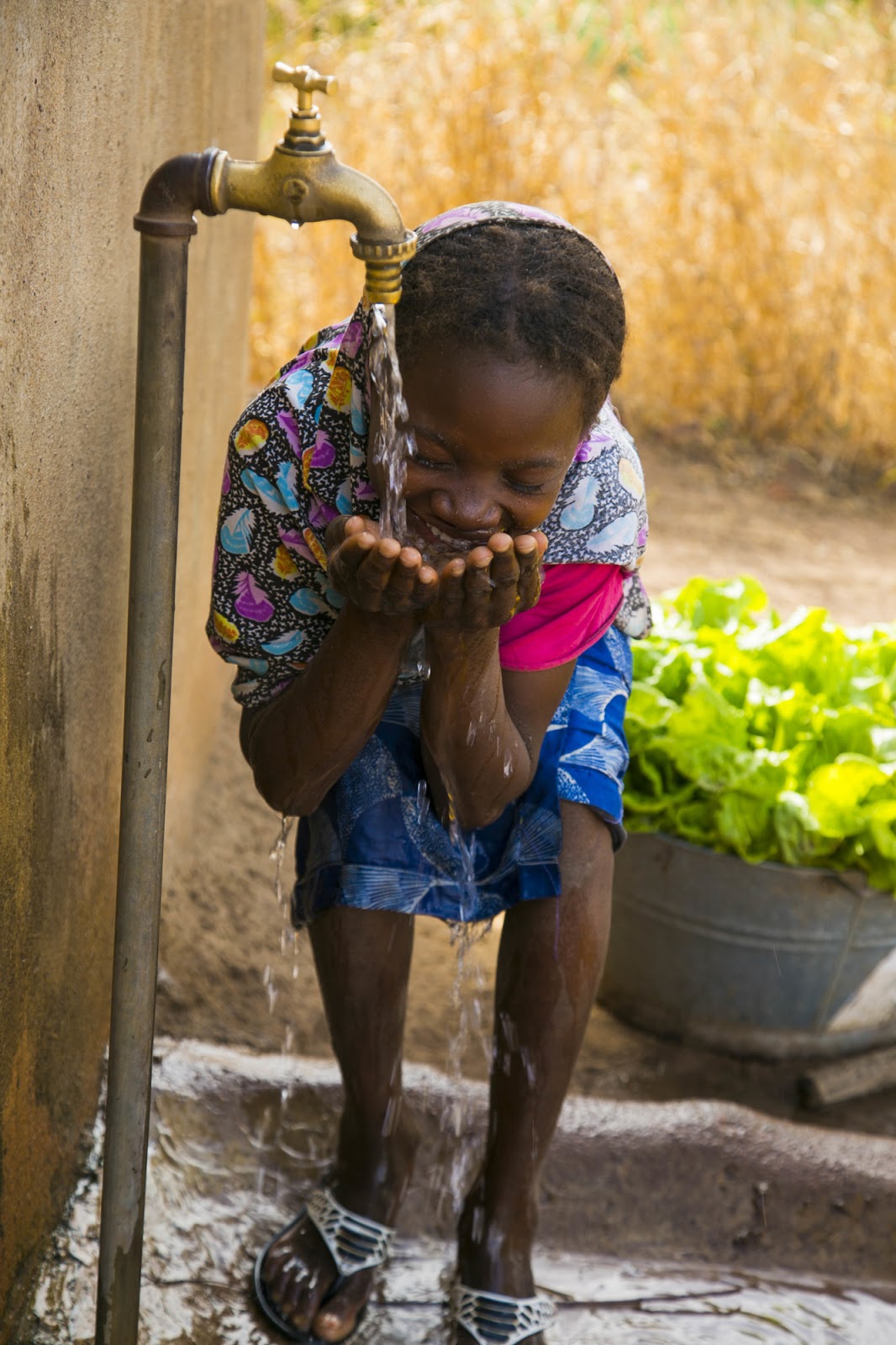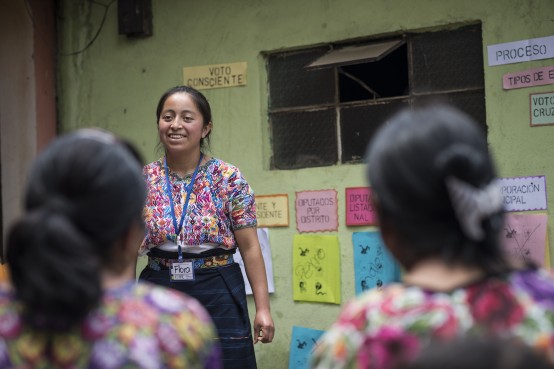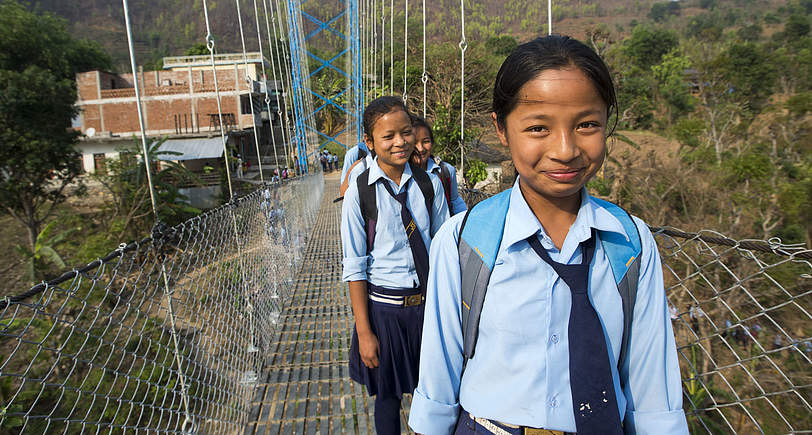Helvetas – oriented towards the needs and interests of the local communities
By Denise Nanni and Milena Rampoldi, ProMosaik. In the
following our interview with Corina Tschudi of the Swiss Organisation Helvetas engaged in the field of
international cooperation. Corina told us about the history and aims of her
organisation. Would like to thank her for her time and the photos she sent us.
following our interview with Corina Tschudi of the Swiss Organisation Helvetas engaged in the field of
international cooperation. Corina told us about the history and aims of her
organisation. Would like to thank her for her time and the photos she sent us.

How
was Helvetas founded?
was Helvetas founded?
It all started in 1954 when a group of civilian
service workers, quakers, refugee helpers and engineers decided to make a
(Swiss) contribution to the material, social and cultural development of
economically disadvantaged people outside Europe. Supported by two personally
committed national government officials, the group founded the organisation
“Schweizerisches Hilfswerk für aussereuropäische Gebiete -SHAG” (Swiss aid
agency for extra-european areas) in June 1955.
service workers, quakers, refugee helpers and engineers decided to make a
(Swiss) contribution to the material, social and cultural development of
economically disadvantaged people outside Europe. Supported by two personally
committed national government officials, the group founded the organisation
“Schweizerisches Hilfswerk für aussereuropäische Gebiete -SHAG” (Swiss aid
agency for extra-european areas) in June 1955.
With only a few thousand Swiss francs in the start-up
fund and not more than two project ideas in mind (Nepal and Iraq), the group
established the association. By autumn 1955, first sums of money and technical
instruments were brought to Nepal. Project work expanded rapidly, and SHAG established
a reputation as an expert on drinking water.
fund and not more than two project ideas in mind (Nepal and Iraq), the group
established the association. By autumn 1955, first sums of money and technical
instruments were brought to Nepal. Project work expanded rapidly, and SHAG established
a reputation as an expert on drinking water.
By the time the Swiss Confederation and established
relief organisations ventured into the “third world” with their own
projects, SHAG had been already active in Nepal, Tunisia and Cameroon (early 1960s).
Its experiences and project approaches were very much in demand and the Swiss Confederation
increasingly assigned projects to SHAG. At the same time, competition from
other relief organisations increased and different ideas regarding the
strategic orientation of the organisation appeared. As a result, personnel
changes and structural reforms were made and finally, the name changed: SHAG
became Helvetas.
relief organisations ventured into the “third world” with their own
projects, SHAG had been already active in Nepal, Tunisia and Cameroon (early 1960s).
Its experiences and project approaches were very much in demand and the Swiss Confederation
increasingly assigned projects to SHAG. At the same time, competition from
other relief organisations increased and different ideas regarding the
strategic orientation of the organisation appeared. As a result, personnel
changes and structural reforms were made and finally, the name changed: SHAG
became Helvetas.
In 2011 Helvetas merged with Intercooperation and is
since then called HELVETAS Swiss Intercooperation.
since then called HELVETAS Swiss Intercooperation.
On
what issues do you concentrate your activities?
what issues do you concentrate your activities?
The main focus of our work is on international development
projects. HELVETAS Swiss Intercooperation is committed to improving the living
conditions of disadvantaged people in rural parts of Africa, Asia, South and
Central America and Eastern Europe. With 1600 collaborators in about 30
countries, we focus on the specific areas of Water and Infrastructure (water
and sanitation, water for food, bridges and roads), Rural Economy (food,
organic farming and Fairtrade), Environment and Climate Change (soils, forests,
water and energy), Skills Development and Education (basic literacy and
vocational training) and Governance and Peace (human rights and culture). HELVETAS
Swiss Intercooperation also weaves several crosscutting themes into all its
projects and programmes to enhance their effectiveness: Gender and Social
Equity, Capacity Development and Partnership, and Learning and Innovation.
projects. HELVETAS Swiss Intercooperation is committed to improving the living
conditions of disadvantaged people in rural parts of Africa, Asia, South and
Central America and Eastern Europe. With 1600 collaborators in about 30
countries, we focus on the specific areas of Water and Infrastructure (water
and sanitation, water for food, bridges and roads), Rural Economy (food,
organic farming and Fairtrade), Environment and Climate Change (soils, forests,
water and energy), Skills Development and Education (basic literacy and
vocational training) and Governance and Peace (human rights and culture). HELVETAS
Swiss Intercooperation also weaves several crosscutting themes into all its
projects and programmes to enhance their effectiveness: Gender and Social
Equity, Capacity Development and Partnership, and Learning and Innovation.

In
which way do you identify a place where an intervention is needed?
which way do you identify a place where an intervention is needed?
Poor and disadvantaged people are at the heart of HELVETAS
Swiss Intercooperation’s work in our partner countries. Our actions are aimed
at men and women, households, local communities and civil society
organisations, as well as small and medium-sized companies. As social exclusion
is increasingly a factor in poverty, we target our support towards women and
other socially disadvantaged groups, including young people.
Swiss Intercooperation’s work in our partner countries. Our actions are aimed
at men and women, households, local communities and civil society
organisations, as well as small and medium-sized companies. As social exclusion
is increasingly a factor in poverty, we target our support towards women and
other socially disadvantaged groups, including young people.
We focus on supporting people in rural areas, to whom
little of nationwide development benefits trickle down. As a result of rapid
urbanisation we are also active in the catchment areas of larger cities and in
small and medium-sized towns. We recognise the strong linkages between rural
and urban areas and build capacities of people to use the full potentials of
these linkages.
little of nationwide development benefits trickle down. As a result of rapid
urbanisation we are also active in the catchment areas of larger cities and in
small and medium-sized towns. We recognise the strong linkages between rural
and urban areas and build capacities of people to use the full potentials of
these linkages.
Do
you involve civil society in your activities? If yes, how?
you involve civil society in your activities? If yes, how?
HELVETAS Swiss Intercooperation’s projects are
oriented towards the needs and interests of the local communities. They
themselves should be able to determine the kind of support they most urgently
require. Therefore, the participation of civil society in planning and
implementing projects is HELVETAS Swiss Intercooperation’s foremost priority.
oriented towards the needs and interests of the local communities. They
themselves should be able to determine the kind of support they most urgently
require. Therefore, the participation of civil society in planning and
implementing projects is HELVETAS Swiss Intercooperation’s foremost priority.
However, involving local people also means that they
must actively strive to improve their living conditions and are prepared to
take on responsibility for the projects and make contributions in kind. These
may be material or in the form of voluntary work. In order to make locals fit
to continue activities and maintain established infrastructure such as water
provision systems for example, HELVETAS Swiss Intercooperation organises
training and capacity building of the communities and/or local partner
institutions and their staff.
must actively strive to improve their living conditions and are prepared to
take on responsibility for the projects and make contributions in kind. These
may be material or in the form of voluntary work. In order to make locals fit
to continue activities and maintain established infrastructure such as water
provision systems for example, HELVETAS Swiss Intercooperation organises
training and capacity building of the communities and/or local partner
institutions and their staff.

Do
you cooperate with local authorities and institutions? (of the countries where
you carry on your projects) If yes, how?
you cooperate with local authorities and institutions? (of the countries where
you carry on your projects) If yes, how?
We believe that successful development cooperation
requires strong local partners who can build a bridge between foreign aid and
domestic needs. Therefore, in its projects, HELVETAS Swiss Intercooperation
always works with local partners, not only from civil society, but also
government bodies or actors from the private sector. With this approach,
sustainable and widespread impact can be ensured.
requires strong local partners who can build a bridge between foreign aid and
domestic needs. Therefore, in its projects, HELVETAS Swiss Intercooperation
always works with local partners, not only from civil society, but also
government bodies or actors from the private sector. With this approach,
sustainable and widespread impact can be ensured.
This cooperation with local partners is based on
mutual respect and with consideration for our partners’ autonomy. HELVETAS
Swiss Intercooperation sets great store by an open exchange of information,
clear agreement on joint goals and a clear allocation of responsibilities.
Dependence is avoided and partners are empowered to run the project on their
own at the end of the phase of joint implementation.
mutual respect and with consideration for our partners’ autonomy. HELVETAS
Swiss Intercooperation sets great store by an open exchange of information,
clear agreement on joint goals and a clear allocation of responsibilities.
Dependence is avoided and partners are empowered to run the project on their
own at the end of the phase of joint implementation.
Pictures:
Mali by Fatoumata Diabate
Guatemala by Simon Opladen
Nepal by Narendra Shrestha


